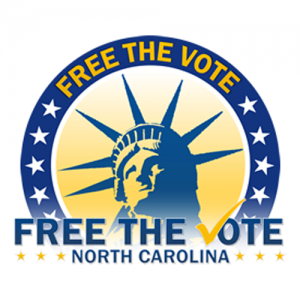
Having witnessed a rancorous government shutdown and near breach of the federal debt ceiling, plenty of Americans are pessimistic about where we’ll go from here as a country.
Just don’t count Omar Ali among them.
The historian and associate professor of African American Studies at UNC Greensboro believes “we’re at the very beginning of a transformation in American politics”and he’s helping shape it as co-founder of North Carolina Independents, a nonpartisan association of independent voters focused on political reform.
The group, an affiliate of the national organization IndependentVoting.org, has developed a network of about a thousand active supporters across the state. In the past few weeks alone, it has seen a surge of interest from fellow residents worn out by the unending warfare between Republicans and Democrats.
“Innovation has always come from those outside of the establishment, be it in science, culture or politics,” says Ali, a national authority on independent voters who has been interviewed by CNN, NPR and other major media outlets. “Independents are the outsiders. We bring innovation because we’re not dependent upon the establishment, even as we look to partner up with insider players to reform our existing political system.”
Reform starts, Ali believes, with changing how we talk about politics. Right now, that debate is mostly framed by policy and inevitably involves taking sides on parties and ideology. What we really need to examine, he says, is the political process itself. That process in North Carolina is custom built by Democrats and Republicans to favor the interests of their parties. Partisan redistricting and high barriers to appearing on ballots are among factors that discourage participation from independents – and undermine grass-roots engagement that might spark innovation.
Independents on the rise
There’s no denying that independents are a rising political force. Nationally, 40 percent of voters self-identify as independent. In North Carolina, 1.6 million voters, or 26 percent of all voters, are independent, and two out of every three new voters here register as unaffiliated.
The newest generation of voters seems very likely to accelerate that trend. In the eight weeks prior to last year’s presidential election, Ali and a team of researchers conducted a face-to-face poll of more than 1,200 politically independent students at 16 colleges across North Carolina, ranging from Appalachian State, Wake Forest and UNC Greensboro to Duke, N.C. State, UNC-Chapel Hill and UNC Wilmington.
Of the students surveyed, nearly two-thirds said they are “anti-party,” and many favored reforming political structures to make partisanship less prominent in the political process.
And it is indeed those structures that make it nearly impossible for independents to vote in lawmakers who themselves are independent. Despite the swelling ranks of unaffiliated voters, North Carolina does not have a single political independent serving in the state legislature or in Congress.
Why? For starters, as the recent federal government shutdown reminded us, Democrats and Republicans in many states have redrawn congressional districts in ways that often limit real competition. Even more significantly, however, Democrats and Republicans in North Carolina have an iron-fisted grip on the statewide electoral process.
Building networks
Because of rules established by the two parties, only members of the Republican or Democratic parties can obtain seats on county boards of election. Independent candidates running for statewide seats need to collect 100,000 signatures just to get on the ballot. Democrats and Republicans don’t need any signatures at all. Hemmed in by these parameters, candidates are compelled to align themselves with one of the two major parties.
The work of N.C. Independents includes building networks of independents across the state, recruiting candidates to run as independents and also trying to persuade current lawmakers to change their status to independent. “We’re constantly having lawmakers tell us, ‘We would become independents if only we could,’” Ali says. But fear of backlash from the major parties in the next election cycle and the back-breaking work of gathering so many petition signatures merely to appear on the ballot dissuades them.
As a historian, Ali knows that every movement in American history that’s really mattered – from the founding revolution to abolition to women’s rights and civil rights – started with small networks that slowly grew in size and power, often over generations. Decades of grass-roots political organizing has turned independents into a major player in New York, which Ali cites as a model for how independents can influence elections and policy over time.
“We’re focused on changing the conversation and looking at the long term,” Ali says. “This work is in the very early stages.”